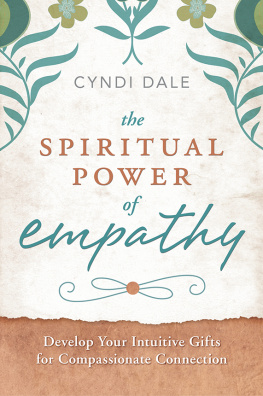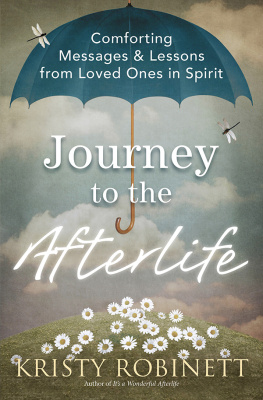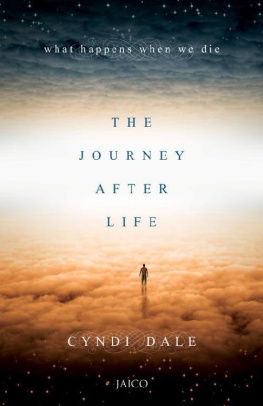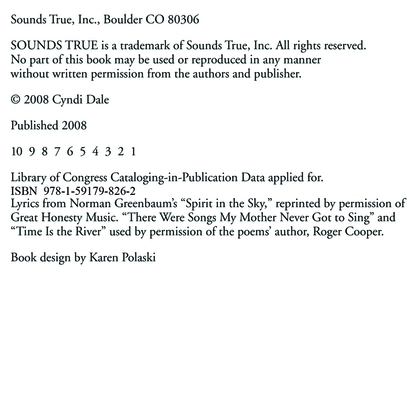First and foremost a thank-you to Jo Ann Deck, whose ideas and dreams of heaven initiated this book, and also to Karine and Karen of Earth Futures in Russia, whose persistent request for a book about the afterlife finally made me sit down and write it.
More than a thank-youan awed bowto Sounds True founder, Tami Simon, who has established a company illuminated with the integrity she herself displays, a standard equally illustrated by Jennifer Coffee, whose belief in this book invited it into being. Cathy Scofield was an invaluable first editor, even driving to Boulder to hear my wild ideas, while Sheridan McCarthy, freelance editor, pulled information from my depths, creating a book that truly reflects the beauty and hopefulness of the topic. Another huge thank-you to Randy Roark of Sounds True, whose production savvy created the audio version of the Planes, and an additional blessing to Kelly Notaras, editorial director at Sounds True, who has shaped the book into something I am proud of.
Of course, there has been the critical participation of my children: Gabriel, whose wit and wisdom punctuate my writingand whose incessant chatter prompts me to finish my projects quickly and succinctly. Theres my son Michael, whose solid acceptance of death through the years has encouraged my own desire to fearlessly embrace the topic. And there is Katie, my special daughter, whose newborn son reminded me that while souls are exiting, there are always shining ones entering.
And nothing would have come of the book without my business manager and agent extraordinaire, Anthony J. Benson, who found a home for the book, spurred me into action, and provided inspiration and encouragement throughout the process.
Finally, a blessing to everyoneto all of usaffected by the bombing of the World Trade Center in New York on that fateful September 11. The legacy of our sacrifice reminds us that, in the end, our task is to continually choose peace, forgiveness, and love. This is the true wisdom of the Planes of Light.
INTRODUCTION
***
Someone who dies before he dies does not die when he dies.
HOLGER KALWEIT
DREAMTIME & INNER SPACE
What is this invisible landscape called death? Is it the cessation of life as we know it? The beginning of new worlds? Is this experience the same for each of us, or is it unique to our own personalities and characteristics? What possible purpose could there be in such an unknown and unknowable adventure? And what is this veil of not knowing? Why do we fear this thing that we do not know? Is it possible to dispel the clouds and illuminate the subject and the process we call death?
As an energy healer and intuitive counselor, and as a person with many loved ones, I am always aware of death. Clients frequently come to me seeking healing, and sometimes to stave off death. Some come to recover from someone elses death. Others want to learn how to live. My role in every case is the same. I help people to know life and death as identical things, and to fully embrace both.
Most of us are curious about what really happens when we die, but we arent satisfied by the answers we find on TV, in books or magazines, or even in religion classes. There is no conclusive evidence, no certainty, of a life after death. But it is also true that there is nothing certain in life, either. You might apply for a job, but that doesnt mean you will get it. You could become pregnant, but that doesnt mean you will bear a child. You can get out of your bed in the morning, but there is no guarantee that you will return to it that night.
We live on the faith that there will be a tomorrow. And when we are done with tomorrows, we would like to believe that there is something more.
There is.
The Planes of Light.
***
I am psychic. I was raised in a normal family, one that worshipped in the Lutheran Church on Sundays. Psychics were not accepted in a normal world like this. I saw colors around people, which I have come to learn are the chakras and auric fields, energy bands that manage and explain our personalities. I heard ghosts, often awakening in the night to converse with the various deceased people who walked around in our house.
My parents were surprised, and disconcerted, when I knew that one of my grandmothers had died before they told me; she had already visited me, saying her good-byes. I had tea parties with angels, their great white wings dipping into my invisible tea and knocking over the real-life sugar cookies. And I lay awake at night listening to the singing of the wind faeries.
As my parents tried to discourage me from being overimaginative, I began to wonder why I could see and hear things that they could not. And, as children often do, I decided that it must be because there was something wrong with me. I did my best to inhibit my curiosity, to close down. But then I attended my first funeral.
I was in third grade, and it was the funeral of my parents friend Jean. Her body lay in an open casket. She wore a light blue suit and a lot of makeup. I thought she looked awfully still, so I touched her cheek to see if she would respond. She didnt move, and I started to cry. There was no one in this body!
Shes dead, Cyndi, my mother whispered. I asked what that meant. She has gone to heaven to live with God.
What is she doing in heaven? I asked. I had always had many questions; maybe this was the time to get some answers.
She is singing with the angels, my mother explained, seeming satisfied with her answer.
Two thoughts crossed my mind. First, if heaven was all about angels singing, I was not sure I wanted to go there. As a blue-eyed blonde, I was always chosen to represent the angelic realm in plays at school and church. I hated to sing, and I hated angel costumes. Ultimately, being good seemed boring to me, and I thought that if Jean and everyone else were going to go to heaven, I would prefer to go to the other place Id heard about.
The second thought was that my mother had not been correctly informed as to Jeans whereabouts. Jean was certainly not lying in the coffinthat body was emptybut neither was she floating around in some remote heaven. In fact, I could see her in the pastors pulpit!
This was the real Jean, and she looked younger than the artificial Jean in the coffin. Without the horrible, yellowish makeup she appeared vibrant. She was barefoot and looking comfortable in an ethereal spring-green dress. I could hear her faintly; she seemed to be delivering her own sermon, about love and forgiveness. Every so often she would wave her hand and golden light would spill out, float to the floor, and swirl around the feet of those gathered to mark her passing. I wanted to talk to her and began moving toward the pulpit, but my mother dragged me back to my seat.













